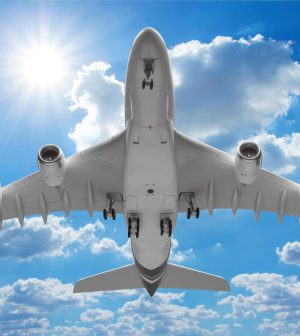- Could Your Grocery Store Meat Be Causing Recurring UTIs?
- Are You Making This Expensive Thermostat Error This Winter?
- Recognizing the Signs of Hypothyroidism
- 10 Strategies to Overcome Insomnia
- Could Artificial Sweeteners Be Aging the Brain Faster?
- Techniques for Soothing Your Nervous System
- Does the Water in Your House Smell Funny? Here’s Why
- Can a Daily Dose of Apple Cider Vinegar Actually Aid Weight Loss?
- 6 Health Beverages That Can Actually Spike Your Blood Sugar
- Treatment Options for Social Anxiety Disorder
New U.S. Rule Mandates Easy Access to Airplane Bathrooms by People Using Wheelchairs

Airlines will now be required to make bathrooms on their planes more accessible for the disabled, the U.S. Department of Transportation announced Wednesday.
The new rule, authorized under the Air Carrier Access Act, requires airlines to make lavatories on any new single-aisle aircraft large enough to allow a passenger with a disability and an attendant to maneuver within the aircraft’s lavatory.
“Traveling can be stressful enough without worrying about being able to access a restroom; yet today, millions of wheelchair users are forced to choose between dehydrating themselves before boarding a plane or avoiding air travel altogether,” U.S. Transportation Secretary Pete Buttigieg said in an agency news release. “We are proud to announce this rule that will make airplane bathrooms larger and more accessible, ensuring travelers in wheelchairs are afforded the same access and dignity as the rest of the traveling public.”
Other new DOT measures that aim to increase disabled access in transportation will:
- Modernize airport terminals, including adding wheelchair ramps and accessible restrooms.
- Fund programs to improve access in train and subway stations so people who use wheelchairs, push strollers or can’t easily navigate stairs can reliably use the rail systems in their communities.
- Lay the groundwork for a future rule that would allow passengers to stay in their own wheelchairs when they fly.
- Call for better training of airline staff who assist passengers with disabilities or handle battery-powered wheelchairs or scooters.
More information
For more on airline passenger rights, see the U.S. Department of Transportation.
SOURCE: U.S. Department of Transportation, news release, July 26, 2023
Source: HealthDay
Copyright © 2026 HealthDay. All rights reserved.










